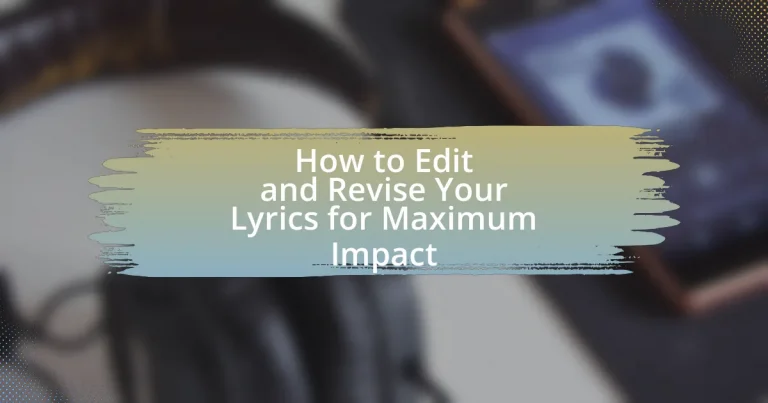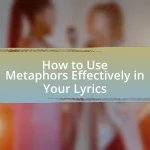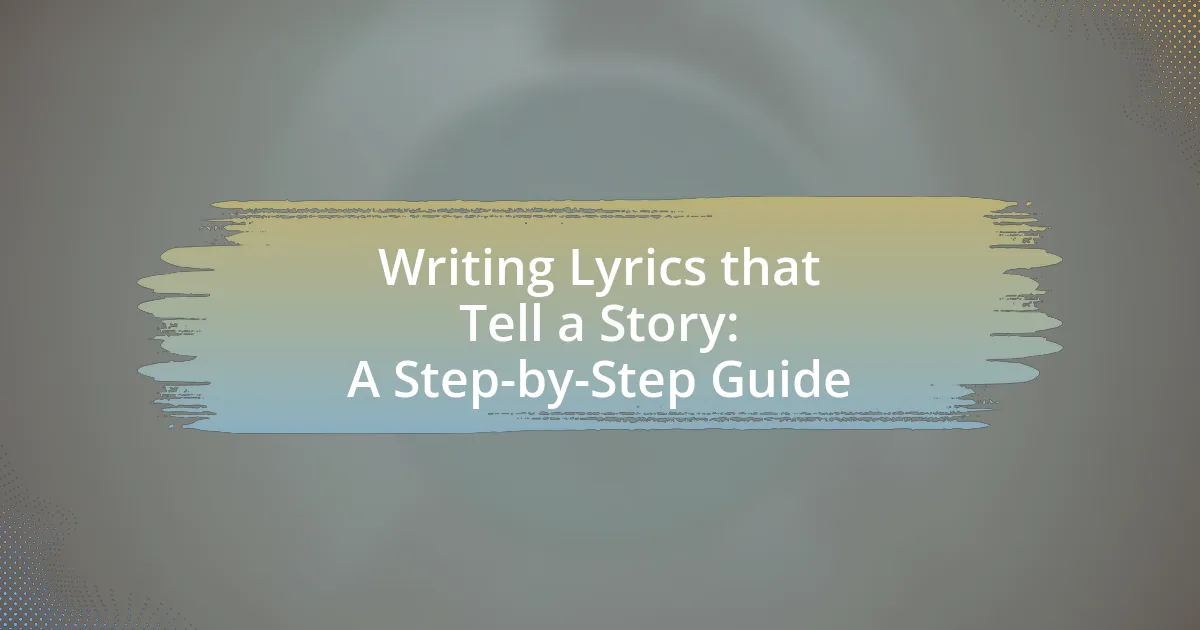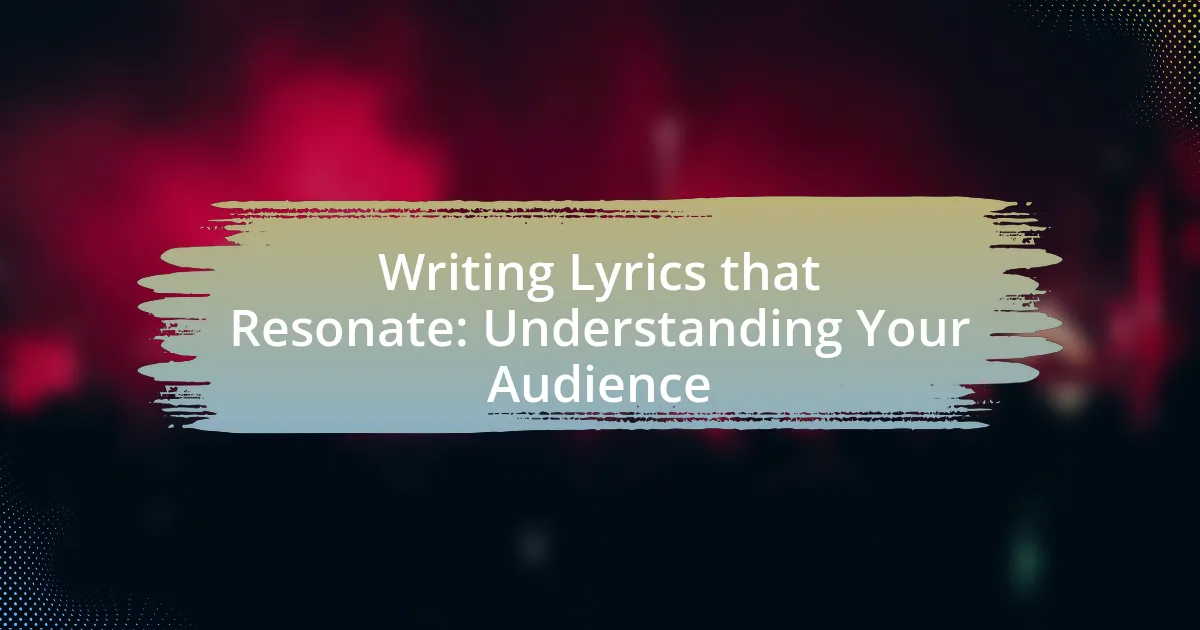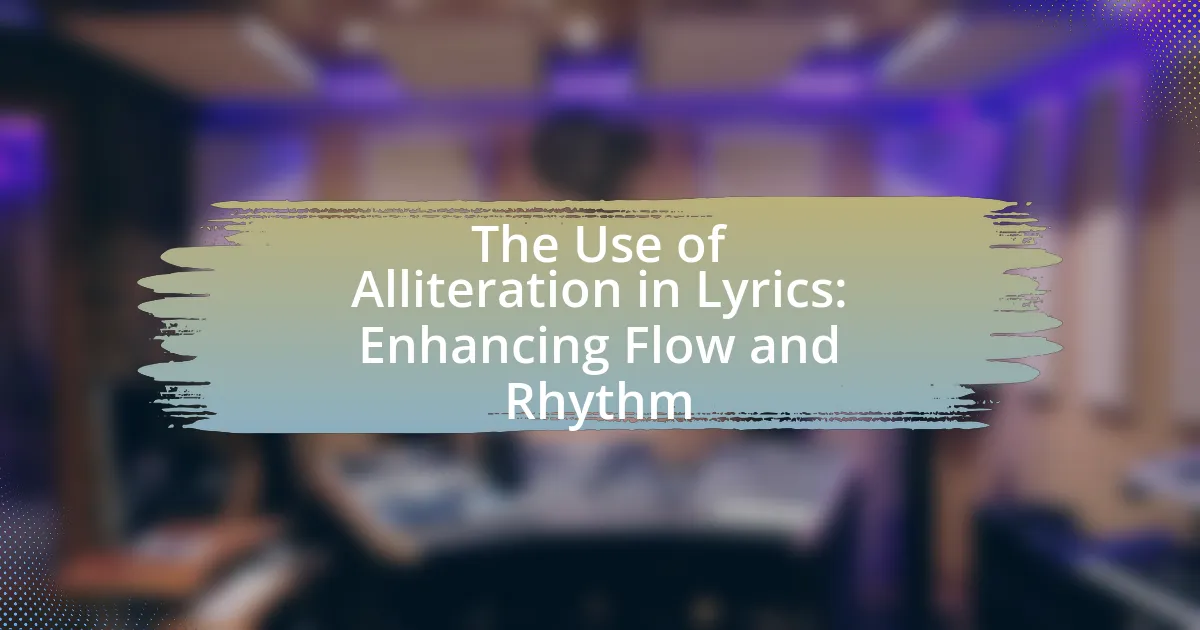The article focuses on the process of editing and revising lyrics to achieve maximum emotional impact and clarity. It outlines the importance of refining language, structure, and imagery to enhance listener engagement, supported by research findings. Key techniques for identifying emotional highs and lows, the significance of word choice, and common pitfalls in the editing process are discussed. Additionally, the article provides practical tips for effective revision, the role of feedback, and the use of tools and resources to improve the quality of lyrics. Overall, it emphasizes the necessity of a structured approach to lyric editing to create powerful and memorable songs.
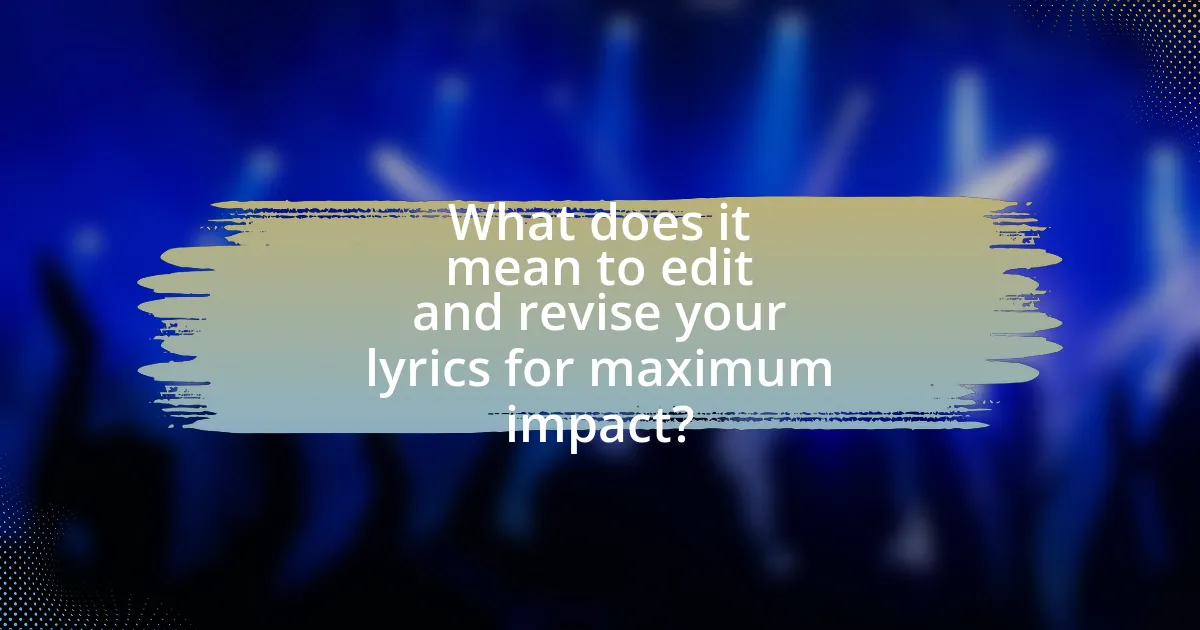
What does it mean to edit and revise your lyrics for maximum impact?
Editing and revising lyrics for maximum impact means refining the words and structure to enhance emotional resonance and clarity. This process involves critically assessing each line for its contribution to the overall message, ensuring that every word serves a purpose and evokes the intended feelings in the audience. For instance, a study by the University of Southern California found that concise and vivid language significantly increases listener engagement, demonstrating the effectiveness of careful editing. By focusing on strong imagery and eliminating unnecessary phrases, songwriters can create more powerful and memorable lyrics that connect deeply with listeners.
How can editing and revising enhance the emotional resonance of your lyrics?
Editing and revising can significantly enhance the emotional resonance of lyrics by refining language, structure, and imagery to better convey feelings. Through careful selection of words and phrases, songwriters can evoke specific emotions, ensuring that each line resonates with the intended audience. For instance, replacing vague terms with vivid imagery can create a stronger emotional connection; studies show that emotionally charged language increases listener engagement. Additionally, revising the song’s structure allows for a more impactful delivery of emotional peaks, as seen in successful songs that build tension and release effectively. This process of editing and revising ultimately leads to lyrics that not only express emotions more clearly but also resonate deeply with listeners, enhancing the overall impact of the song.
What techniques can be used to identify emotional highs and lows in your lyrics?
Techniques to identify emotional highs and lows in lyrics include analyzing word choice, examining imagery, and utilizing musical dynamics. Word choice can reveal emotional intensity; for instance, strong verbs and adjectives often indicate heightened emotions, while softer language may suggest calm or sadness. Imagery plays a crucial role as vivid descriptions can evoke specific feelings, allowing the writer to pinpoint emotional peaks and valleys. Additionally, musical dynamics, such as changes in tempo and volume, can highlight emotional shifts, making it easier to identify where the lyrics convey strong feelings or subdued moments. These techniques collectively provide a structured approach to understanding the emotional landscape of lyrics.
How does word choice influence the emotional impact of your lyrics?
Word choice significantly influences the emotional impact of lyrics by shaping the imagery, tone, and resonance with listeners. Specific words evoke particular feelings; for instance, using “love” instead of “affection” can create a stronger emotional connection due to the intensity associated with love. Research indicates that emotionally charged language activates specific areas of the brain, enhancing the listener’s emotional response (Kensinger, E. A., & Schacter, D. L., 2006, “Processing emotional and non-emotional information: Evidence for the role of the amygdala in emotional memory”). Therefore, careful selection of words can amplify the intended emotional message, making the lyrics more relatable and impactful.
Why is the editing process crucial for lyricists?
The editing process is crucial for lyricists because it enhances the clarity, emotional impact, and overall quality of the lyrics. Through editing, lyricists can refine their word choices, eliminate unnecessary phrases, and ensure that the message resonates with the audience. For instance, a study by the University of Southern California found that well-edited lyrics can significantly increase listener engagement and emotional response, demonstrating the importance of meticulous revision in crafting compelling songs.
What common pitfalls do lyricists face during the editing process?
Lyricists commonly face pitfalls such as over-editing, losing original emotion, and neglecting song structure during the editing process. Over-editing can lead to lyrics that feel overly polished and lack authenticity, which diminishes the emotional connection with listeners. Losing original emotion occurs when lyricists become too focused on technical aspects, resulting in a disconnection from the initial inspiration. Additionally, neglecting song structure can cause lyrics to become disjointed, making it difficult for the song to flow cohesively. These pitfalls can hinder the overall impact of the lyrics, ultimately affecting the song’s reception.
How can a fresh perspective improve the editing of lyrics?
A fresh perspective can significantly enhance the editing of lyrics by introducing new ideas and interpretations that the original writer may overlook. This external viewpoint can identify inconsistencies, suggest alternative phrasing, and highlight emotional resonance that may not be apparent to the original creator. For instance, collaboration with other songwriters or feedback from listeners can reveal how different audiences perceive the lyrics, leading to revisions that make the song more relatable and impactful. Studies in creative collaboration show that diverse input often results in more innovative outcomes, reinforcing the value of incorporating fresh perspectives in the editing process.
What are the key steps in the editing and revising process?
The key steps in the editing and revising process include reviewing the content for clarity, checking for grammatical errors, restructuring sentences for better flow, and ensuring that the message aligns with the intended theme. Initially, reviewing the content allows the writer to identify areas that may be unclear or convoluted. Following this, checking for grammatical errors ensures that the writing adheres to language conventions, enhancing professionalism. Restructuring sentences improves readability and engagement, while aligning the message with the intended theme ensures that the lyrics resonate with the audience. These steps collectively enhance the overall quality and impact of the lyrics.
How do you effectively gather feedback on your lyrics?
To effectively gather feedback on your lyrics, share them with a diverse group of trusted individuals, including fellow songwriters, musicians, and listeners. This approach ensures a range of perspectives, which can highlight different strengths and weaknesses in your work. Research indicates that feedback from varied sources can lead to more comprehensive insights, as different listeners may resonate with different aspects of the lyrics. For instance, a study published in the Journal of Creative Behavior found that collaborative feedback significantly enhances creative output by providing multiple viewpoints.
What specific aspects should you focus on during the revision process?
During the revision process, focus on clarity, coherence, and emotional impact. Clarity ensures that the lyrics convey the intended message without ambiguity, while coherence maintains a logical flow and connection between ideas. Emotional impact is crucial as it engages the listener and evokes feelings that resonate with them. For instance, a study by the University of Southern California found that lyrics with strong emotional content significantly enhance listener engagement and memorability. Therefore, prioritizing these aspects will lead to more effective and impactful lyrics.
How can you transition from editing to finalizing your lyrics?
To transition from editing to finalizing your lyrics, first ensure that all necessary revisions have been made, focusing on clarity, emotional impact, and flow. This involves reviewing each line for coherence and resonance with the intended message. Once satisfied with the edits, perform a final read-through to check for any remaining inconsistencies or awkward phrasing. After this, consider sharing the lyrics with trusted peers or mentors for feedback, which can provide additional perspectives. Finally, once you feel confident in the lyrics’ quality and impact, save the document as the final version, marking it as complete. This structured approach ensures that the transition is thorough and grounded in a clear evaluation process.
What strategies can help maintain the original intent while revising?
To maintain the original intent while revising lyrics, focus on clarity, consistency, and emotional resonance. Clarity ensures that the message remains understandable, while consistency in tone and style preserves the original voice. Emotional resonance connects the audience to the intended feelings, reinforcing the original intent. For instance, when revising, compare each line against the core message of the song to ensure alignment. This method is supported by the principle that effective communication relies on clear and consistent messaging, as highlighted in studies on lyrical analysis and audience engagement.
What tools and resources can assist in the editing and revising of lyrics?
Various tools and resources can assist in the editing and revising of lyrics, including lyric writing software, online rhyme dictionaries, and collaborative platforms. Lyric writing software like MasterWriter and Hooktheory provides features for organizing ideas and generating rhymes, enhancing the creative process. Online rhyme dictionaries such as RhymeZone and Rhymer.com offer extensive databases to find suitable rhymes and synonyms, which can improve lyrical flow and creativity. Collaborative platforms like Google Docs allow multiple users to edit and comment on lyrics in real-time, facilitating feedback and revisions. These resources collectively enhance the editing process by providing structured support and creative inspiration.
How can software and apps enhance the lyric editing process?
Software and apps enhance the lyric editing process by providing tools that streamline writing, facilitate collaboration, and offer advanced editing features. These digital platforms allow lyricists to organize their ideas, track changes, and receive real-time feedback, which can significantly improve the quality of the lyrics. For instance, applications like Google Docs enable multiple users to edit and comment simultaneously, fostering a collaborative environment. Additionally, specialized lyric editing software often includes features such as rhyme suggestions, syllable counting, and formatting options, which help writers refine their work more efficiently. The integration of these tools leads to a more structured and polished final product, ultimately maximizing the impact of the lyrics.
What role do writing groups or workshops play in lyric revision?
Writing groups or workshops play a crucial role in lyric revision by providing constructive feedback and fostering collaboration among songwriters. These environments encourage participants to share their work, receive diverse perspectives, and refine their lyrics based on peer input. Research indicates that collaborative writing can enhance creativity and improve the quality of written work, as seen in studies highlighting the benefits of peer review in artistic processes. By engaging with others, lyricists can identify areas for improvement, explore new ideas, and ultimately create more impactful lyrics.
What are some best practices for editing and revising lyrics effectively?
Best practices for editing and revising lyrics effectively include reading the lyrics aloud, focusing on clarity and emotional impact, and seeking feedback from trusted peers. Reading aloud helps identify awkward phrasing and rhythm issues, ensuring the lyrics flow naturally. Prioritizing clarity ensures that the message resonates with the audience, while emotional impact can be enhanced by refining word choices and imagery. Seeking feedback from others provides new perspectives and constructive criticism, which can lead to significant improvements. These practices are supported by songwriting workshops and expert advice, emphasizing the importance of revision in the creative process.
How can you create a checklist for lyric editing?
To create a checklist for lyric editing, start by identifying key elements to evaluate, such as clarity, rhyme scheme, rhythm, and emotional impact. Each element should have specific criteria; for example, clarity can be assessed by ensuring that the lyrics convey a clear message without ambiguity. Rhyme scheme should be checked for consistency and effectiveness in enhancing the song’s flow. Rhythm can be evaluated by reading the lyrics aloud to ensure they fit the intended musical tempo. Emotional impact should be assessed by determining if the lyrics resonate with the intended audience. This structured approach ensures a comprehensive review of the lyrics, enhancing their overall quality and effectiveness.
What are the benefits of setting aside your lyrics before revising?
Setting aside your lyrics before revising allows for a fresh perspective, enhancing the quality of the final product. This practice helps to distance the writer from their initial emotional attachment, enabling a more objective evaluation of the content. Research indicates that taking breaks can improve cognitive processing and creativity, as noted in studies on incubation effects in creative tasks. By allowing time for reflection, writers can identify areas for improvement, eliminate redundancies, and refine their message more effectively.
What common mistakes should you avoid when editing your lyrics?
When editing your lyrics, avoid common mistakes such as overcomplicating language, neglecting the song’s structure, and failing to maintain emotional consistency. Overcomplicating language can alienate listeners; simple, relatable words often resonate more effectively. Neglecting the song’s structure, such as verse-chorus alignment, can disrupt flow and coherence, making it harder for the audience to engage. Additionally, failing to maintain emotional consistency can confuse listeners, as shifts in tone or theme may detract from the overall message. These mistakes can diminish the impact of your lyrics, making it essential to focus on clarity, structure, and emotional alignment during the editing process.
How can over-editing harm the integrity of your lyrics?
Over-editing can harm the integrity of your lyrics by stripping them of their original emotion and authenticity. When excessive revisions are made, the unique voice and personal experiences that give lyrics their depth may be lost, resulting in generic or overly polished content. Research indicates that authenticity in songwriting is crucial for audience connection; for instance, a study published in the Journal of Popular Music Studies highlights that listeners often resonate more with raw, unrefined expressions rather than meticulously crafted lines. Therefore, maintaining a balance between refinement and authenticity is essential to preserve the emotional impact of lyrics.
What are the signs that your lyrics are ready for finalization?
Your lyrics are ready for finalization when they convey a clear message, resonate emotionally with the intended audience, and have a consistent structure and rhythm. A clear message ensures that the core idea is easily understood, while emotional resonance indicates that the lyrics connect with listeners on a personal level. Consistent structure and rhythm contribute to the overall flow and musicality of the piece, making it more engaging. Additionally, if feedback from trusted peers or mentors is overwhelmingly positive and suggests no further changes are needed, this serves as a strong indicator that the lyrics are polished and ready for completion.
What practical tips can help you edit and revise your lyrics for maximum impact?
To edit and revise lyrics for maximum impact, focus on clarity, emotional resonance, and rhythmic flow. Start by identifying the core message of your lyrics and ensure that every line contributes to that message. Use strong imagery and specific language to evoke emotions, as studies show that vivid imagery enhances listener engagement. Additionally, read your lyrics aloud to assess their rhythm and flow; this practice helps identify awkward phrasing or inconsistencies. Finally, seek feedback from trusted peers or mentors, as external perspectives can highlight areas for improvement that you may overlook.
